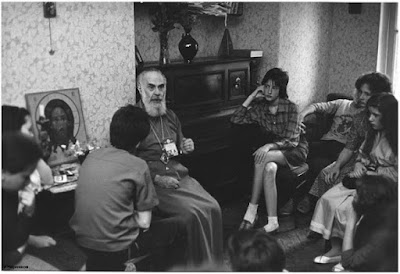I remember when Rowan Williams was made Archbishop of Canterbury his staff had to persuade him to cease his previous practice of opening his own mail not only because of its increase in volume but also because often nestling within was the vituperative poison of the disgruntled and disaffected!
Avril Pyman in her accomplished biography of Metropolitan Anthony of Sourozh gives her own examples of this surprisingly common 'Christian' art form that this particular saintly bishop accrued to himself through his own management of the Russian Patriarchal Church in Western Europe that was his responsibility over many years. The disappointments of Judas, sadly, are always with us.
Since the organisational life of the Church absorbed so much of Anthony's attention and energy, likewise it must occupy his biographer but I confess it is, for me, the least interesting part of the book. The parsing of denominational difference especially when it is within Orthodoxy (rather than betwixt Orthodoxy and other dimensions of Christianity even) can only truly interest the specialist!
But the book comes truly alive when it continually steps back into the reality of the man.
I remember the first time I saw him. It was at a University London mission - the first night had been Michael Ramsey, the former Archbishop of Canterbury, the second night was the Liverpool duo, David Shepherd and Derek Warlock, Anglian and Roman Catholic Bishops of Liverpool respectively; and, the third and last night was Metropolitan Anthony. Whilst the previous speakers had sought to explain to you why you might be a Christian in undoubtedly lively ways, Anthony simply was it. This is how the world is - God's gift - and you lived into that gift by following Christ and to follow you prayed. I had never met anyone, to that time, who radiated such holiness and did so with such charm, serenity and wit.
Afterwards I read his books - all of which carry the same straightforwardness of an experienced conviction that never talk at the reader, simply invite them in (rather akin to the photograph above). They, also, as the philosopher, Jacob Needleman noticed (in his book, 'Lost Christianity') have a strikingly 'objective' feel -unsentimental, direct, alive - as if sharing a discovery that anyone can discover if they place their attention and will in the right direction. Grace is ever present waiting to respond. Faith is a matter of observation and experience, not of belief.
This too was my experience of the man when we subsequently met (and I discovered through the book that by this stage - bearing on his age and health - this was a privilege). There were not many meetings but he taught me prayer (which is after all rather like saying he taught me the one thing necessary)! I remember each time we met (and the last time was in the more public forum of a Diocesan conference), I always found myself oscillating between embracing him and running away because he had a way of looking at you that saw through you. There was I felt to be no hiding place - especially not from my own conscience! I also had that sense that though I stored up questions to ask, actually what mattered was not the 'answer' as such but a presence that let the reality he witnessed to unfold, dissolve the question.
It was a similar sense I had with the only other person I have met (as yet) who carried quite the same embodied, objective holiness: Dom Bede Griffiths. When we met for the first time, after a prolonged correspondence, likewise I had saved up all manner of question, all of which seemed to evaporate as we simply enjoyed lunch together, bathed in his kindliness!
Perhaps it is a mark of sainthood - that you step with them, however, momentarily into the world seen aright, made its true self again, all cleansed and transfigured; and, there is nothing striking about this except its naturalness from which usually we stand estranged in our myriad complications. We see the difference that makes the difference and, hopefully, re-gird our loins to dispose ourselves to the closure of that gap.

Comments
Post a Comment